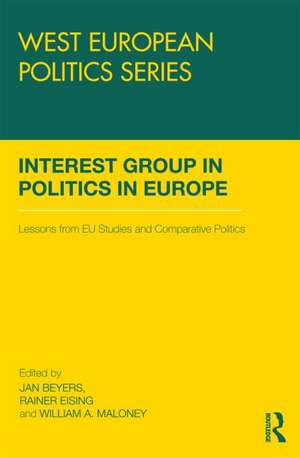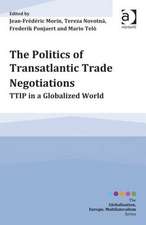Interest Group Politics in Europe: Lessons from EU Studies and Comparative Politics: West European Politics
Editat de Jan Beyers, Rainer Eising, William A. Maloneyen Limba Engleză Hardback – 29 iul 2009
This book is a systematic and comprehensive effort at investigating and integrating the state of the art in European interest group research. Combining the analysis of interest group politics in the EU with the comparative study of interest organizations, the book seeks to identify the areas about which there is consolidated knowledge, that are marked by controversies, in which considerable uncertainty exists, that have been omitted from research programs and that ought to be part of future studies. Thereby, it provides a general reflection on how the study of interest group politics can be improved by linking it to the comparative study of governance.
This book was published as a special issue of West European Politics.
| Toate formatele și edițiile | Preț | Express |
|---|---|---|
| Paperback (1) | 414.39 lei 6-8 săpt. | |
| Taylor & Francis – 29 mar 2012 | 414.39 lei 6-8 săpt. | |
| Hardback (1) | 1056.32 lei 6-8 săpt. | |
| Taylor & Francis – 29 iul 2009 | 1056.32 lei 6-8 săpt. |
Din seria West European Politics
-
 Preț: 319.16 lei
Preț: 319.16 lei -
 Preț: 258.67 lei
Preț: 258.67 lei -
 Preț: 165.25 lei
Preț: 165.25 lei -
 Preț: 416.22 lei
Preț: 416.22 lei - 16%
 Preț: 264.18 lei
Preț: 264.18 lei -
 Preț: 389.38 lei
Preț: 389.38 lei -
 Preț: 323.23 lei
Preț: 323.23 lei -
 Preț: 389.38 lei
Preț: 389.38 lei -
 Preț: 273.35 lei
Preț: 273.35 lei - 18%
 Preț: 1002.50 lei
Preț: 1002.50 lei - 27%
 Preț: 496.97 lei
Preț: 496.97 lei -
 Preț: 416.22 lei
Preț: 416.22 lei -
 Preț: 449.41 lei
Preț: 449.41 lei -
 Preț: 323.23 lei
Preț: 323.23 lei -
 Preț: 416.22 lei
Preț: 416.22 lei - 17%
 Preț: 259.98 lei
Preț: 259.98 lei -
 Preț: 384.59 lei
Preț: 384.59 lei - 16%
 Preț: 260.93 lei
Preț: 260.93 lei - 15%
 Preț: 708.81 lei
Preț: 708.81 lei - 18%
 Preț: 1001.39 lei
Preț: 1001.39 lei - 16%
 Preț: 130.21 lei
Preț: 130.21 lei -
 Preț: 383.33 lei
Preț: 383.33 lei -
 Preț: 449.41 lei
Preț: 449.41 lei - 28%
 Preț: 526.02 lei
Preț: 526.02 lei - 16%
 Preț: 323.91 lei
Preț: 323.91 lei - 21%
 Preț: 258.63 lei
Preț: 258.63 lei - 26%
 Preț: 764.62 lei
Preț: 764.62 lei -
 Preț: 409.69 lei
Preț: 409.69 lei - 18%
 Preț: 1002.80 lei
Preț: 1002.80 lei - 25%
 Preț: 824.34 lei
Preț: 824.34 lei - 25%
 Preț: 767.20 lei
Preț: 767.20 lei
Preț: 1056.32 lei
Preț vechi: 1288.19 lei
-18% Nou
Puncte Express: 1584
Preț estimativ în valută:
202.13€ • 216.14$ • 168.53£
202.13€ • 216.14$ • 168.53£
Carte tipărită la comandă
Livrare economică 17 aprilie-01 mai
Preluare comenzi: 021 569.72.76
Specificații
ISBN-13: 9780415451192
ISBN-10: 0415451191
Pagini: 224
Dimensiuni: 156 x 234 x 23 mm
Greutate: 0.5 kg
Ediția:1
Editura: Taylor & Francis
Colecția Routledge
Seria West European Politics
Locul publicării:Oxford, United Kingdom
ISBN-10: 0415451191
Pagini: 224
Dimensiuni: 156 x 234 x 23 mm
Greutate: 0.5 kg
Ediția:1
Editura: Taylor & Francis
Colecția Routledge
Seria West European Politics
Locul publicării:Oxford, United Kingdom
Public țintă
PostgraduateCuprins
Concepts and Themes 1. Researching Interest Group Politics in Europe and Elsewhere: Much We Study, Little We Know? Jan Beyers, Rainer Eising and William Maloney Institutions and Interest Groups 2. Opportunity Structures in the EU Multi-Level System Sebastiaan Princen and Bart Kerremans 3. ‘Enlargement Waves’ and Interest Group Participation in the EU Policy-Making System: Establishing a Framework of Analysis Spyros Blavoukos and George Pagoulatos Logics, Patterns and Power 4. Clientelism, Committees, Pluralism and Protests in the European Union: Matching Patterns? Rainer Eising 5. Policy Issues, Organisational Format and the Political Strategies of Interest Organisations Jan Beyers 6. Interest Groups in the European Union: How Powerful Are They? Andreas Dür Comparative and Normative Perspectives 7. The European Interest System in Comparative Perspective: A Bridge Too Far? David Lowery, Caelesta Poppelaars and Joost Berkhout 8. Converging Perspectives on Interest Group Research in Europe and America Christine Mahoney and Frank Baumgartner 9. Interest Groups and Democracy in the European Union Sabine Saurugger 10. Conclusion: Embedding Interest Group Research Jan Beyers, Rainer Eising and William Maloney
Notă biografică
Jan Beyers is Professor of Political Science at the University of Antwerp, Belgium.
Rainer Eising is Professor of Comparative Politics at the Ruhr-University Bochum.
William A. Maloney is Professor of Politics at the University of Newcastle, UK.
Rainer Eising is Professor of Comparative Politics at the Ruhr-University Bochum.
William A. Maloney is Professor of Politics at the University of Newcastle, UK.
Descriere
This book is a comprehensive effort at investigating and integrating the state of the art in European interest group research, providing a general reflection on how the study of interest groups politics can be improved by linking it to the comparative study of governance.














